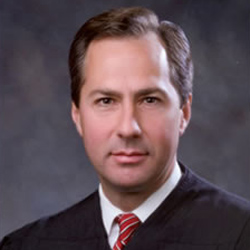Judge on Trump's Supreme Court short list proposes discovery ban for cases worth less than $500K

Judge Thomas Hardiman of the 3rd U.S. Circuit Court of Appeals.
A judge who was on President Donald Trump’s Supreme Court short list had a surprising proposal to provide quicker federal trials during a Federalist Society panel last month.
Judge Thomas Hardiman of the 3rd U.S. Circuit Court of Appeals at Philadelphia said he would support a rule change to eliminate discovery in federal cases worth less than $500,000, Slate reports. David Lat, founder of Above the Law, tweeted Hardiman’s comment and noted it appears at 52:09 on this video.
“If I were able to do something unilaterally, I would probably institute a new federal rule that said all cases worth less than $500,000 would be tried without any discovery,” Hardiman said.
After some applause, Hardiman’s proposal was endorsed by Judge Amul Thapar of the 6th Circuit at Cincinnati, another judge said to be on Trump’s Supreme Court short list. Thapar said clients and lawyers would both be happier if they could get to trial more quickly.
Hardiman jumped back in with this comment: “How many clients win, and the judgment they earned was less than the fees they paid their lawyer? That’s a Pyrrhic victory.”
Hardiman floated the idea when the discussion turned to vanishing jury trials in federal courts and judges’ increasing reliance on alternative dispute resolution. Hardiman said that a trial can be “a beautiful alternative” to resolve disputes and recalled a case when he was a lawyer defending an excavator under federal labor laws for $22,000.
A “really wise” senior judge gave Hardiman’s client his day in court and summarized his conclusions: The excavator violated the law and should pay about $7,500, Hardiman said. The excavator pulled out his checkbook and wrote the check.
Slate noted that federal rules already require that discovery be “proportional to the needs of the case.” The article goes on to raise some concerns about eliminating discovery completely in cases worth less than $500,000.
“Discovery is a key element of our current adversarial system,” the article said. “Often, it’s how people get evidence of legal violations, via admissions in sworn testimony, or smoking-gun documents, or memos demonstrating wrongdoing.”
Discovery can help ordinary people obtain information that is buried by large corporations or obtain important information in cases brought to vindicate constitutional rights, Slate says. “In so many cases, there’s a lot more at stake than just dollars and cents, which is why discovery shouldn’t be available for high-end litigants only,” the article said.
Thapar defended his comment and elaborated in an interview with Lat at Above the Law. Citizens are disenchanted, Thapar said, because they can’t get their day in court, while lawyers are disenchanted because they spend too much time on discovery.
“This is not an issue of favoring plaintiffs or favoring defendants,” Thapar said. “Both sides can abuse the discovery process. A defendant can use discovery to run out the clock on the plaintiff and to make the plaintiff run out of money. I support an equal playing field for plaintiffs and defendants—and the way to get that equal playing field is not by having unlimited discovery.”
Thapar said that, when he was a trial judge, he implemented a pilot program encouraging civil cases to go from the lawsuit filing to trial in one year. The program put the onus on him to move cases along. There are other pilot programs with another twist.
“One proposal the courts are exploring in pilot programs is having a civil Brady rule,” Thapar said. “In civil litigation, the parties would have an affirmative obligation to turn over discovery that’s harmful to them. Under the status quo, such crucial evidence often gets buried or lost under a huge amount of irrelevant evidence—the needle in the haystack.”



